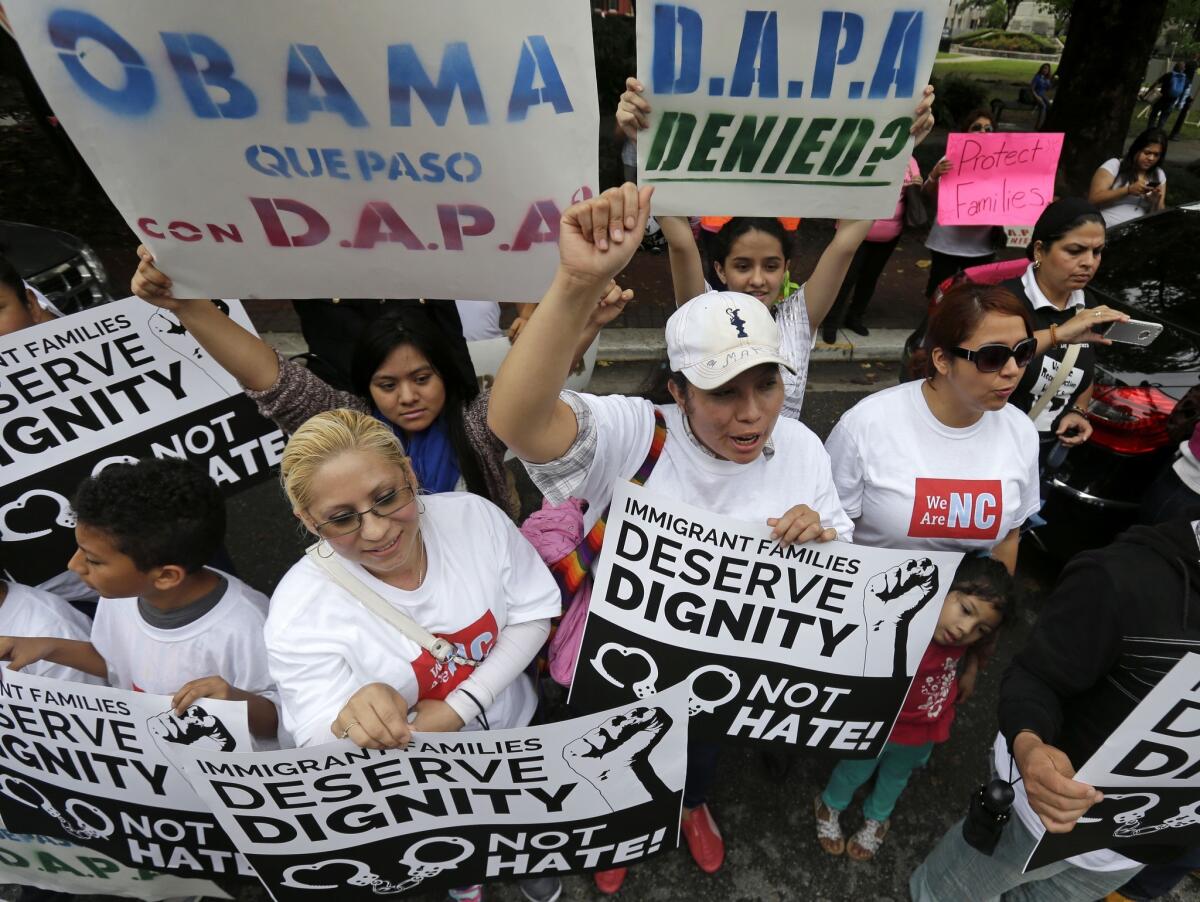Appeals court panel takes up challenge to Obama’s immigration actions

Demonstrators, led by the New Orleans Worker Center for Racial Justice and the Congress of Day Laborers, participate in a rally outside the U.S. 5th Circuit Court of Appeals in New Orleans, where judges are considering the constitutionality of President Obama’s executive actions on immigration.
A panel of three federal appeals court judges grilled government lawyers Friday about whether to lift a temporary stay on President Obama’s executive action, which seeks to shield up to 5 million people from deportation.
The judges — two appointed by Republican presidents, one by Obama — were randomly selected from among 15 on the conservative U.S. 5th Circuit Court of Appeals, and they did not rule on the stay from the bench. But they asked plenty of pointed questions during the unusual hearing, which included more than 2 1/2 hours of oral arguments.
The gallery was packed with about 80 spectators, including immigrants eligible for deferred action and the attorney general for Louisiana, who joined the lawsuit to stop the president’s programs.
Both sides left feeling optimistic.
“This lawsuit is not about the wisdom of any particular immigration policy. The lawsuit is about the separation of powers,” said Scott Keller, Texas solicitor general, who argued on behalf of states that sued to stop the programs.
“This is about a 26-state coalition upholding the rule of law,” Keller said as he left court, noting that “the arguments went very well” and calling the judges “very engaged” and “very well prepared.”
Nora Preciado, staff attorney with the National Immigration Law Center based in Los Angeles, which filed a brief in support of the federal government’s case, also left the hearing feeling encouraged.
“We remain very confident that these programs will be implemented,” Preciado said as about 50 immigrants and supporters demonstrated in a nearby park. Immigrants traveled from across the country to attend the hearing and protest outside, drumming and chanting loud enough to be heard inside the courtroom.
Preciado and others had attended a vigil outside court the night before and lined up early to get some of the limited courtroom seats.
Among the group was Juan Ramos, 21, who moved to Charlotte, N.C., illegally from El Salvador seven years ago. He was eligible for deferred action and had prepared an application so he could study architecture at the University of Colorado at Boulder.
“We got our hopes up,” he said, “then all this happened, and my dreams went down.”
At issue was the Obama administration’s proposed extension of the Deferred Action for Childhood Arrivals program, or DACA, created in 2012, and the new Deferred Action for Parents of Americans and Legal Permanent Residents, or DAPA, which was scheduled to start in May.
U.S. District Judge Andrew S. Hanen, sitting in Brownsville, Texas, had granted the preliminary injunction to Texas, Louisiana and the 24 other states after they sued to stop the programs, arguing that the president had overstepped his constitutional authority. The Obama administration’s appeal led to Friday’s hearing.
Arguing for the federal government was Benjamin C. Mizer, acting assistant U.S. attorney general for the Justice Department’s Civil Division and a former Ohio solicitor general.
“The Constitution gives control over immigration policies including over the removal of aliens to the federal government,” Mizer said at the start, calling the lawsuit “unprecedented.”
“The states do not have standing to challenge the downstream effects of federal immigration policy,” he told the judges.
He noted that those who qualify for DAPA have American children. “There are real humanitarian costs for removing these individuals,” he said.
Mizer was challenged by Judge Jerry E. Smith, a Reagan appointee, and Judge Jennifer Walker Elrod, a George W. Bush appointee, about the impact of deferred action on the states and their ability to challenge it.
“In order for us to find for you on the stay, we would have to find you likely to succeed on the merits” of the case, Elrod said.
Mizer called the government’s likelihood of success “extraordinary.”
He argued that the president was within his rights in creating the programs, that Texas would not be not harmed as a result and that a finding for the states would open the door for more lawsuits to halt other kinds of federal action.
Elrod pressed him.
“What if DAPA gave voting rights — would that be reviewable and would that be constitutional?” she asked. “Would the states be able to challenge that?”
Keller argued that deferring deportation would force the state to face substantial added costs, such as providing driver’s licenses, education and healthcare. He said suggestions that such immigrants provide benefits to the states were “irrelevant” and “speculative.”
“DAPA would be one of the largest changes in immigration policy in our nation’s history,” Keller told the panel.
He argued that Obama bypassed Congress to create a policy of deferred action that the states were forced to follow without proper administrative notice.
Judge Stephen A. Higginson, an Obama appointee to the court and former federal prosecutor, questioned how much discretion federal officials have in evaluating whether applicants qualify for deferred action, calling it a “tricky issue” and “the nub of this case.”
“That’s what this all comes down to, right?” Higginson said. “Is this in fact true prosecutorial discretion?”
He noted that the Department of Homeland Security was “removing more people than in any time in U.S. history.” Deferred action postpones but doesn’t halt deportation, he said, and those screening DACA applications often requested additional information — indicating it was discretionary, not a “rubber-stamping” policy.
Higginson suggested that most DACA applicants were probably approved not because of a lack of discretion, but because those who came forward had stronger cases.
“It’s not an amnesty. No one is contending this makes them non-removable,” Higginson said of those who receive deferred action, even suggesting that future administrations could use the programs to better track and deport some of those who entered the country illegally.
But he also recognized why the states sued.
“They’re just saying, ‘We want to be heard.’ Texas is just saying, ‘We’ve got arguably some voice,’” he said.
It’s not clear how soon the panel will rule. If the administration loses, it can appeal to the full 5th Circuit and ultimately to the U.S. Supreme Court.
More to Read
Start your day right
Sign up for Essential California for news, features and recommendations from the L.A. Times and beyond in your inbox six days a week.
You may occasionally receive promotional content from the Los Angeles Times.







